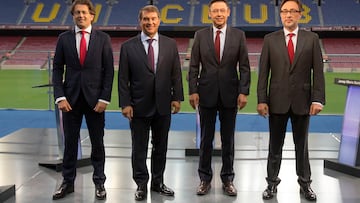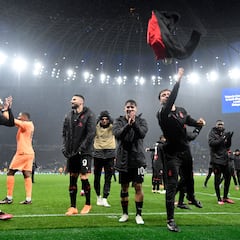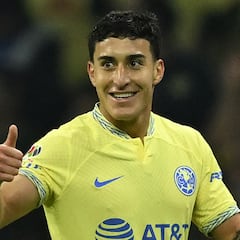What are the most notable scandals of FC Barcelona?
The prosecutor’s office is now investigating the Spanish Club for their payments of seven million euros to the vice president of referees, Enrique Negreira, over the last 20 years.


The Barcelona Prosecutor’s Office investigation for alleged payments of 1.4 million euro made by FC Barcelona, between the years of 2016 and 2018, to José María Enríquez Negreira is just the latest scandal the club has seen itself involved in the last two decades.
Negreira is a former referee and was number two on the Technical Committee of Referees (CTA) between 1994 and 2018. In 2001, the club’s president, Joan Gaspar, reached out to Negreira to reach a deal for his services, and thus starting the relationship between the club and, at the time, the vice-president of referees. But this is just the latest of many scandals over the last 20 years.
⚽ According to Spanish newspaper El Mundo. The ex-referee contacted the team after Real Madrid won the league that year and offered his services to help them with the VAR system🤐#LaLiga #Soccer #Football pic.twitter.com/SBXcBL4mXg
— AS USA (@English_AS) March 8, 2023
What are Barcelona’s biggest scandals in the last twenty years?
The Neymar signing: This scandal caused Sandro Rosell to resign as president of Barcelona. The case came to light when Jordi Cases, a member of the club, demanded to know exactly how the club acquired the player. Barcelona claimed that they paid 57 million euros for the Brazilian star, but an investigation revealed a payment of 40 million euros to the player’s father.
Brazilian investment fund DIS, which held 40% of Neymar’s sporting rights when he moved to Barcelona, argued they had lost out with the true value of the deal being concealed.
The payments began in 2010, with 10 million, and then later in 2013, with another 30 million. Rosell left the team amidst the investigation. Later, in 2016, in a bid to draw a line under the affair, the club reached an agreement with prosecutors and accepted a $5.5 million fine in respect of what the club recognised were “an error in tax planning”. The club admitted the total cost of signing the player was nearer 100 million euro.
Moreover, in 2017 Sandro Rosell was sent to jail for two years on money laundering charges, with claims his marketing company had laundered fees for broadcast rights to the Brazilian national team’s friendly games. In February 2019 he was given a conditional release, before being acquitted in April that year.
Lionel Messi and the Spanish Tax agency: In 2010, a process against the then-Barcelona forward was started over his intentional defrauding of the Spanish tax authorities. Spanish tax inspectors argued that the Argentine, with his father Jorge Messi, created fake corporations in Belize and Uruguay in 2007-09 to defraud the state. The companies were under the name of the mother. The defense argued that Messi had not been involved in the tax evasion and that the scheme was entirely done under the advisement of their accountants.
The court threw out the defense’s claims and sentenced Messi and his father to 21 months in jail each. However, Messi did not go to jail because in Spain, for these types of crimes, if the sentence is under two years, the person is not required to go to prison if it is a first offense. If however the guilty individual is already a convicted person in Spain the rule does not apply, meaning that if Messi were to ever commits another crime in the country, he could go to jail even if the sentence is under two years.
In addition to Messi, Javier Mascherano, Alexis Sánchez, and Adriano Correia paid a combined total of about €7 million in fines and restitution for their roles in defrauding the tax authorities. (Note that many of the tax cases around this time were very different from Messi’s and involved the tax authorities changing their interpretation of already confusing rules. How Messi’s tax fraud is different to other cases.)
Pique and the Spanish Super Cup: Spanish newspaper El Confidencial published audios and documents back in 2022 that indicated a possible agreement between Kosmos, a company owned by Gerard Pique, and the Spanish Football Federation (RFEF).
The deal would see a multimillion-dollar commission be paid to the player for his help in transferring the Spanish Super Cup to Saudi Arabia. The Spanish government is currently investigating the contract to determine if any wrongdoing was done.
Related stories
Barcagate: The latest of the scandals. As mentioned before, the team paid Enrique Negreira, ex-vice president Technical Committee of Referees in Spain, 7 million euros from 2001 until 2018. The Spanish prosecutor’s office officially accused the team of three corruption charges.
The team states that they paid Negreira for reports on the referees and to create a neutral environment between them and Real Madrid. It is unclear if the prosecutor’s office believes this claim. The process is only starting, so expect another long, potentially damaging, saga for the Catalan giants.
⚽ The lawsuit would be for sports corruption over the payment of seven million euros to former refereeing official José María Enríquez Negreira 😱#Soccer #LaLiga #Football #Barca pic.twitter.com/kfcN4tGXm0
— AS USA (@English_AS) March 8, 2023

